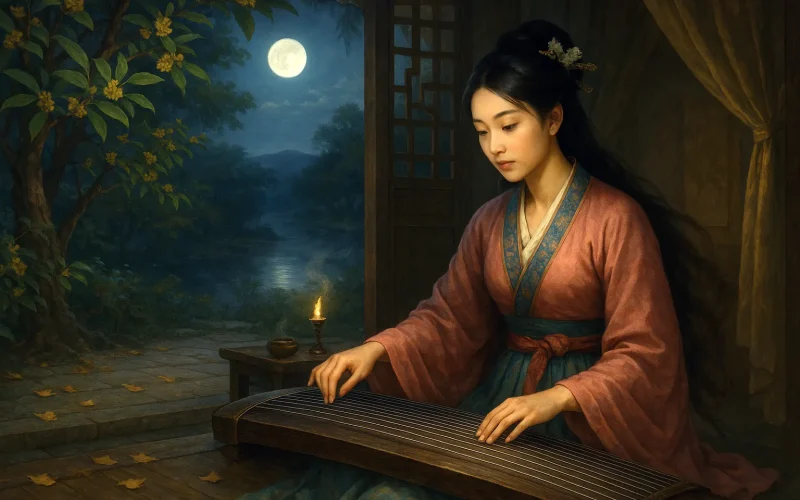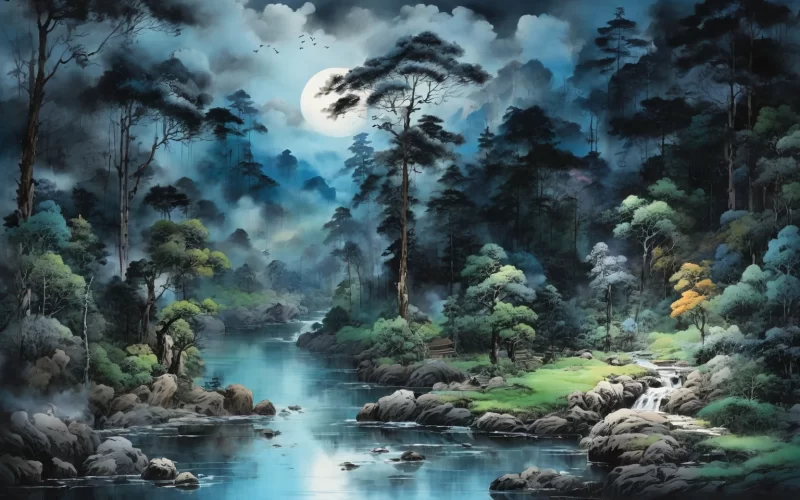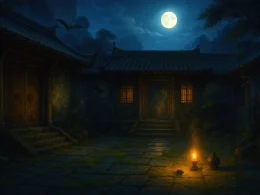Under the crescent moon a light autumn dew
Has chilled the robe she will not change --
And she touches a silver lute all night,
Afraid to go back to her empty room.
Original Poem
「秋夜曲」
王维
桂魄初生秋露微, 轻罗已薄未更衣。
银筝夜久殷勤弄, 心怯空房不忍归。
Interpretation
This landscape poem depicts the tranquility of an autumn night and the poet's inner solitude. Wang Wei masterfully blends natural imagery with personal emotion, conveying profound philosophical reflection through concise and vivid language. The verses capture the quiet beauty of the season while revealing the poet's lonely introspection, demonstrating his deep connection to nature and contemplative mind.
First Couplet: "桂魄初生秋露微,轻罗已薄未更衣。"
Guì pò chū shēng qiū lù wēi, qīng luó yǐ báo wèi gēng yī.
The autumn moon newly rises, dew barely forms—
My thin silk robe feels the chill, yet I do not change.
These lines delicately establish the time and season—early autumn night, where the moon's glow and faint dew signal the deepening cold. The poet, unwilling to change his light robe, hints at a quiet melancholy, using the subtle chill to mirror his inner solitude.
Second Couplet: "银筝夜久殷勤弄,心怯空房不忍归。"
Yín zhēng yè jiǔ yīn qín nòng, xīn qiè kōng fáng bù rěn guī.
Late into the night, I pluck the silver zither with care—
My heart fears the empty room; I cannot bear to return.
Here, the poet’s loneliness deepens. Despite the late hour, he lingers over the zither, delaying his return to an empty chamber. The music becomes an escape, while the "fear" of solitude underscores his longing for warmth and companionship.
Holistic Appreciation
The poem weaves together the moon, dew, and an empty room to evoke the poet’s quiet sorrow. The first couplet sets a cool, autumnal tone, subtly aligning nature’s stillness with the poet’s isolation. The second intensifies this mood—music fills the night, yet the dread of an empty space lingers. Without explicit lament, the imagery (sound, light, and absence) builds an unspoken ache, revealing Wang Wei’s mastery of unstated emotion.
Artistic Merits
In this poem, Wang Wei exemplifies his signature landscape style—a harmonious unity of nature and inner spirit. Through concise language and vivid natural imagery, he deeply embeds personal emotion within the scenery. More than mere depiction of landscapes, the verses reveal the poet's psyche through the external world, conveying his meditation on solitude and his lyrical communion with nature.
The poem is economical yet profound—its restrained language belies complex emotions, all unfolding within the quiet ambiance of an autumn night. Wang Wei's technique here perfectly encapsulates his poetic essence: vivid pictorial description interwoven with emotional resonance, creating space for deep contemplation.
Insights
Wang Wei’s poem invites us to sit with solitude rather than flee it. In modern life’s rush, such quiet nights—moonlit, musical, introspective—offer rare clarity. The empty room, though daunting, becomes a space for honest self-encounter. The lesson endures: stillness, like autumn’s chill, can sharpen awareness of what truly lingers in the heart.
Poem translator
Kiang Kanghu
About the poet

Wang Wei (王维), 701 - 761 A.D., was a native of Yuncheng, Shanxi Province. Wang Wei was a poet of landscape and idylls. His poems of landscape and idylls, with far-reaching images and mysterious meanings, were widely loved by readers in later generations, but Wang Wei never really became a man of landscape and idylls.











